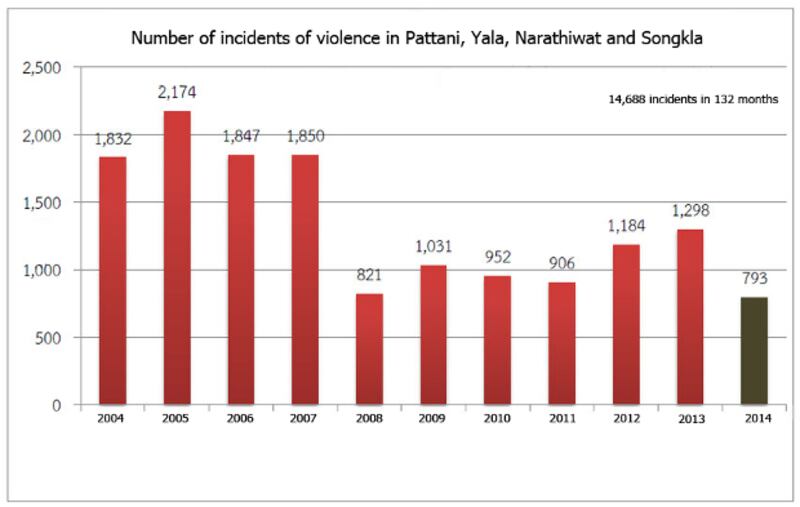Violence in Thailand’s far southern region decreased markedly in 2014, according to recent reports, but such statistics don’t tell the whole story, distraught local residents told BenarNews.
Deep South Watch (DSW), a civil society group that monitors violence in Thailand’s Deep South region, earlier this year reported that 2014 saw a 39 percent drop in violent incidents related to the insurgency there compared with 2013.

From Jan. 1, 2014 through Dec. 24, 2014, there were a total of 793 insurgency-linked incidents, compared with 1,298 over the same period in 2013, according to the statistics released by DSW.
The group has tracked the number of incidents related to the armed southern separatist movement during the 11 years since the insurgency broke out in 2004.
‘Something is wrong’
But residents of provinces in the Deep South say that other types of crime persist and that some of it is linked with the insurgency.
Yala province resident Kamanruddeen Baho, 56, welcomed the decrease in violence, but said burning issues remained unsolved, such as drugs, contraband, criminal syndicates and corruption.
A storm will follow the relative lull in violence, he predicted.
“Something is wrong and it is scarier than having routine violence. Because the perpetrators will again make themselves known through more violence, it will be more serious. And that will certainly be more losses and damages,” Kamanruddeen told BenarNews.
In his view, officials lack a comprehensive view of the situation. They need to confront problems that locals face, which range from falling prices for crops to the criminality of area youths, he said.
“As long as the root cause is not uprooted, the problems will never go away. How many officials think that youngsters stealing residual rubber, bananas, water melon and coconuts is a problem? The officials decline to take reports, and we feel it is unjust. I believe the problems will not go away,” Kamanruddeen said.
Pattani province resident Wae-asae Yemasoh, 46, agreed that statistics about violence did not paint an accurate picture of the Deep South and its problems.
For locals, the real signs of progress would be justice, reasonable food prices and normal livelihoods.
“Today, we are facing problems of drugs and depreciated prices in agricultural products. The youthful addicts don’t work but steal, and if they can’t find money to buy drugs, they take their frustration out on villagers. Often times, they lose control and fire shots into the air and the local community leaders refuse to solve the problem. Local villagers are left helpless,” he told BenarNews.
“Some of the youngsters are under protection of government officials or local mafia-type gang bosses, adding to problems for the locals. Once a report is filed, the officials say they didn’t find any weapons with the suspects. The officials overlook it but the people are suffering,” Wae-asae said.
Official: crime victims should file police reports
Local authorities in Yala’s Yaha district acknowledged the existence of these other problems, saying they needed to be dealt with in order to curb future violence.
"We admit to the existence of such social problems. Initially, we issued a few measures to cope with the incidents. We have reiterated to Kamnan (village cluster head), village heads, village protection forces and religious cleric leaders to identify the wrong-doers and bring them to justice," Kongsakul Chantarat, Yaha district chief and the director of Yaha's district operation center said.
“The important thing is that we encourage the locals who faced troubles to file a report to the police, otherwise the perpetrators will get away with it and will not feel shameful and will commit more crimes regardless of the rule of law,” the district chief told BenarNews.
